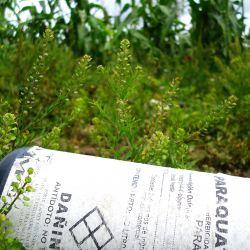Environmental activist groups and trial lawyers have launched a new campaign in their legal effort to restrict access to synthetic pesticides. We reported in late June that Syngenta and Chevron, the two largest manufacturers and distributors of the herbicide paraquat, are battling more than 150 suits alleging that the weedkiller causes Parkinson's Disease (PD). Making the same complaint, the Farmworker Association of Florida, represented by the non-profit EarthJustice, sued the EPA three weeks ago for re-approving paraquat.
Jeannie Economos, a pesticide safety project coordinator with the Farmworker Association of Florida said it was “unconscionable that EPA so devalues the lives of farmworkers as to allow the continued use of this harmful toxic pesticide." Assuming she's correct about the herbicide's toxicity, the EPA's actions would be unconscionable. But a careful reading of the evidence indicates that Economos and her association have overstepped the evidence and exaggerated the risk posed by paraquat exposure
As I wrote in June, paraquat probably can't cross the blood-brain barrier efficiently enough to cause the neurological damage at the root of PD. My colleague Dr. Josh Bloom has helpfully explained the relevant details here. Studies that report low rates of Parkinson's in workers at paraquat-production facilities further undermine the ongoing litigation.
But there's more. A new “review of reviews” surveying the evidence for the PD-paraquat association has created yet another major scientific hurdle for the plaintiffs. The author, physician-epidemiologist Dr. Douglas Weed, evaluated 12 review articles, including several meta-analyses, published since 2006. A total of 85 studies were analyzed in these 12 papers. After collecting information about each review's funding and methodology when available, Weed concluded that:
No author of any published review stated that it has been established that exposure to paraquat causes Parkinson’s disease, regardless of methods used and independent of funding source. A consensus exists in the scientific community that the available evidence does not warrant a claim that paraquat causes Parkinson’s disease.
Settled science?
Recent history has taught us that trial lawyers aren't constrained by scientific evidence in product liability suits. This isn't surprising, but I sometimes have to marvel at how skillfully attorneys can leapfrog the mountain of research that contradicts their case. The paraquat suits offer a perfect illustration. Not only has every study refused to finger the weedkiller as a cause of PD, many of these papers fail to provide the information we would need to make such a determination. As Weed noted:
- Several animal studies have suggested a mechanism by which paraquat exposure could cause Parkinson's, but "a mechanism of action lacks sufficient evidence."
- In animal studies, rodents are given massive doses of paraquat over short time periods. Aside from the fact that pesticide applicators don't dose themselves with weedkillers, this kind of study design doesn't demonstrate anything about the effects of chronic (repeated over an extended period) paraquat exposure.
- Many studies lack quality paraquat exposure data. Some PD patients have worked with the weedkiller, but we don't know how much they've been exposed to or how often they've been exposed, because they self-report their exposure. Researchers often ask PD patients questions like: have you "ever personally used/mixed or applied paraquat one or more times?”
This dearth of evidence hasn't prevented just the authors of individual studies from drawing a firm conclusion. Reputable organizations including the National Institute of Environmental Health Sciences and the Mayo clinic, while acknowledging that pesticide exposure may be a risk factor for PD, have recognized that paraquat hasn't been implicated as a cause of the disease.
“Follow the money” doesn't work
Studies around controversial issues like pesticide safety are often assumed to be biased by their funding. Research financed or conducted by a chemical's manufacturer, the argument goes, probably won't uncover serious health risks even if they exist. The same allegation can be made against researchers who have an incentive to find evidence that a pesticide is dangerous, say, academics who regularly serve as expert witnesses in litigation against pesticide companies.
“[R]esearch funding comes from many sources, including corporations, non-governmental organizations, and government agencies,” the new review explained, “each of which has 'interests' that could potentially affect the scientific process.” None of that is relevant to the paraquat controversy, however, because every study, regardless of its funding, has reached roughly the same conclusion. As Weed concluded:
... [I]ndustry funding appears not have had an impact on the results [of the reviewed studies]. After all, the conclusion that the available evidence does not warrant a causal conclusion regarding paraquat and Parkinson’s disease emerged independent of funding source. This fact represents a simple and single refutation of the perception, especially in epidemiology, that research funded by industry is necessarily biased
This isn't to say we will never uncover good evidence that paraquat exposure causes or contributes to PD. But these lawsuits are moving forward now, with the existing evidence, which should present a significant problem for the plaintiffs' expert witnesses. Indeed, they probably won't be able to get around it, Weed argued, if they properly assess the paraquat literature :
Indeed, that scientific consensus presents a significant hurdle for the scientific experts hired by the attorneys representing the claimants, i.e., the plaintiffs. After all, those experts can only prevail if they can legitimately claim that the science to date on paraquat and Parkinson’s disease represents a causal relationship in direct contrast to the consensus presented here. That will not be easy if objective—i.e., systematic—methods are employed.




